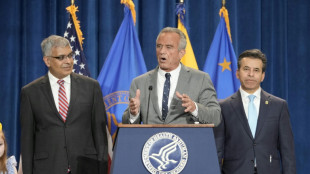
-
 Indian army says new exchange of gunfire with Pakistan
Indian army says new exchange of gunfire with Pakistan
-
Epstein accuser Virginia Giuffre takes own life in Australia: family

-
 Hundreds of buildings damaged, dozens injured in 6.3 Ecuador quake
Hundreds of buildings damaged, dozens injured in 6.3 Ecuador quake
-
India and Pakistan's Kashmir fallout hits economy too

-
 Francis's funeral to be grand farewell to 'pope of the poor'
Francis's funeral to be grand farewell to 'pope of the poor'
-
Pogacar faces defiant Evenepoel at Liege-Bastogne-Liege

-
 Chelsea eye great escape against Barcelona in Women's Champions League
Chelsea eye great escape against Barcelona in Women's Champions League
-
Iran, US to hold new round of high-level nuclear talks

-
 'Energy and effort' pay off for Reds as Blues' woes continue
'Energy and effort' pay off for Reds as Blues' woes continue
-
Albatross and closing birdie lift China's Liu to LPGA Chevron lead

-
 On the horizon? Wave of momentum for high seas treaty
On the horizon? Wave of momentum for high seas treaty
-
Developing countries should fast-track US trade deals: World Bank president

-
 Grizzlies' Morant 'doubtful' for must-win game 4 v Thunder
Grizzlies' Morant 'doubtful' for must-win game 4 v Thunder
-
Trump in Rome for pope funeral in first foreign trip of new term

-
 Trump says Russia-Ukraine deal 'very close' after new Kremlin talks
Trump says Russia-Ukraine deal 'very close' after new Kremlin talks
-
US rookies lead PGA pairs event with McIlroy and Lowry in hunt

-
 Trump tariff promises get a reality check
Trump tariff promises get a reality check
-
Warriors coach Kerr 'relatively optimistic' injured Butler will play game 3

-
 Postecoglou hopes 'Stonecutter's Credo' can inspire Spurs
Postecoglou hopes 'Stonecutter's Credo' can inspire Spurs
-
PSG lose unbeaten Ligue 1 record ahead of Arsenal showdown

-
 Venezuela accuses El Salvador president of 'human trafficking'
Venezuela accuses El Salvador president of 'human trafficking'
-
Own goal takes Sundowns to African final against Pyramids

-
 Scores of buildings damaged, 20 injured in Ecuador quake
Scores of buildings damaged, 20 injured in Ecuador quake
-
US stocks extend rally as market eyes busy calendar next week

-
 Pope's death triggers surge of disinformation he fought against
Pope's death triggers surge of disinformation he fought against
-
Rovanpera takes control of Rally Islas Canarias

-
 Zelensky insists Crimea is Ukrainian as US envoy meets Putin
Zelensky insists Crimea is Ukrainian as US envoy meets Putin
-
Patel and Mendis help Sunrisers beat Kings in Dhoni's 400th T20

-
 Copa del Rey ref statements 'unacceptable': Real Madrid after boycotting final build-up
Copa del Rey ref statements 'unacceptable': Real Madrid after boycotting final build-up
-
Insurance CEO's accused killer pleads not guilty to federal murder charges

-
 FBI arrests Wisconsin judge for shielding undocumented migrant
FBI arrests Wisconsin judge for shielding undocumented migrant
-
Brazil ex-president Collor de Mello jailed for corruption

-
 Zelensky insists Crimea 'belongs' to Ukraine as US envoy meets Putin
Zelensky insists Crimea 'belongs' to Ukraine as US envoy meets Putin
-
Real Madrid boycott Copa del Rey build-up over referee complaints

-
 Trinidad and Tobago votes for parliament, PM, with opposition in lead
Trinidad and Tobago votes for parliament, PM, with opposition in lead
-
IMF chief hails 'constructive' Spring Meetings held under tariff uncertainty

-
 Iran FM Araghchi in Oman ahead of nuclear talks with US
Iran FM Araghchi in Oman ahead of nuclear talks with US
-
Dozens of buildings destroyed, 20 injured in Ecuador quake

-
 Young Barca must 'enjoy' Real Madrid Copa final fight: Flick
Young Barca must 'enjoy' Real Madrid Copa final fight: Flick
-
Pakistan and India border closure separates families

-
 Brazil's Bolsonaro 'stable' after post-surgery setback
Brazil's Bolsonaro 'stable' after post-surgery setback
-
Catholics in secular Cuba hail Francis as 'bridge'

-
 US envoy Witkoff, Putin discuss 'possibility' of direct Russia-Ukraine talks
US envoy Witkoff, Putin discuss 'possibility' of direct Russia-Ukraine talks
-
Community seeks answers after French school knife killing

-
 German prosecutors seek jail terms in VW 'dieselgate' trial
German prosecutors seek jail terms in VW 'dieselgate' trial
-
Sabalenka makes winning start at Madrid Open

-
 EU, US should de-escalate and negotiate trade deal: IMF Europe director
EU, US should de-escalate and negotiate trade deal: IMF Europe director
-
Russia accuses Ukraine of killing general in car bombing

-
 Emery wants FA Cup glory and Champions League berth for Villa
Emery wants FA Cup glory and Champions League berth for Villa
-
Buildings destroyed, one injured in Ecuador quake


Anti-Covid drug may have led to virus mutations: study
An anti-Covid drug widely used across the world may have caused mutations in the virus, researchers said on Monday, but there was no evidence that the changes had led to more dangerous variants.
Pharmaceutical giant Merck's antiviral pill molnupiravir was one of the earliest treatments rolled out during the pandemic to prevent Covid becoming more severe in vulnerable people.
The drug, which is taken orally over a five-day course, works mainly by creating mutations in the virus with the goal of weakening and killing it.
However, a new UK-led study has shown that molnupiravir "can give rise to significantly mutated viruses which remain viable," lead author Theo Sanderson told AFP.
Sanderson, a geneticist at London's Francis Crick Institute, emphasised that there is no evidence that "molnupiravir has to date created more transmissible or more virulent viruses."
None of the variants that have swept the world were due to the drug, he added.
But "it is very difficult to predict whether molnupiravir treatment could potentially lead to a new widely circulating variant which people don't have prior immunity to," he added.
- Mutational signature -
For the study, which was published in the journal Nature, the researchers sifted through databases of more than 15 million genome sequences of SARS-CoV-2, the virus that causes the Covid disease.
The researchers used this data to track changes in how the virus mutated during the pandemic, finding signs of a particular "mutational signature" in patients they believe is linked to molnupiravir.
In 2022, as the drug was prescribed in huge numbers, there was a significant increase in patients who had this mutational signature, the study found.
This signature was more commonly found in countries where the drug was widely prescribed, such as the United States, UK, Australia and Japan.
But in countries where it was not approved, including Canada and France, it was rarer.
Merck refuted the study, saying the researchers had relied on "circumstantial associations" between where and when the sequences were taken.
"The authors assume these mutations were associated with viral spread from molnupiravir-treated patients without documented evidence of that transmission," Merck said in a statement sent to AFP.
Sanderson rebuffed this claim, saying the researchers had used "several independent lines of evidence to identify with confidence that molnupiravir drives this mutational signature".
That included a separate analysis of treatment data in England, which found that more than 30 percent of mutation events involving the signature were in people who had taken molnupiravir.
However, just 0.04 percent of people in England were prescribed the drug in 2022, the study said.
Other anti-Covid drugs do not work in the same manner, so would not cause these kinds of mutations, Sanderson said.
- 'Incredibly important' -
Experts not involved in the study seemed to side with the British researchers.
Stephen Griffin, a virologist at the UK's University of Leeds, said it was an "incredibly important, well-conducted piece of research".
Jonathan Ball, a virologist at the University of Nottingham, said the research showed a "strong link" between molnupiravir and the occasional, limited spread of highly mutated genomes.
"What isn't clear is if any of the transmitted viruses contained mutations which would change how they would behave -- for example if they were more or less transmissible, more pathogenic or less susceptible to our immunity," he added.
The experts emphasised that molnupiravir is not dangerous to people who are currently taking the drug.
They also did not call for the drug to be abandoned altogether.
Molnupiravir is already being used by itself "less and less" as its effectiveness had waned against vaccinated people who are not at risk, Griffin said.
While the existing research might suggest that molnupiravir should no longer be prescribed by itself, "it shouldn't be discarded and could still be valuable if we were to use it in drug combinations," he added.
Sales of molnupiravir, sold under the brand name Lagevrio, topped $20 billion last year. However sales fell 82 percent in the second quarter of 2023 compared to the same period last year, according to Merck.
B.Finley--AMWN


